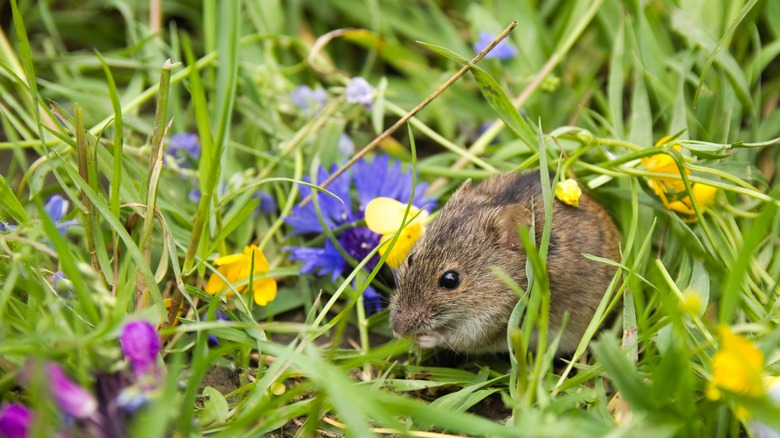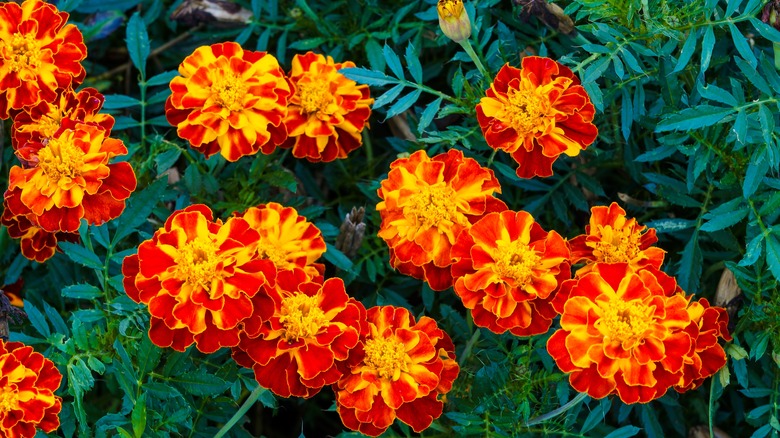Gardeners Swear Planting Marigolds Can Repel Mice And Other Pests, But Does It Work?
Many gardeners have experienced the horrors of waking up to find their precious gardens ruined by mice. The work of rodents in your garden is undeniable. Everything from seeds, roots, foliage, to fruit -– nothing is off-limits to them. And depending on how your garden is laid out, you may be providing mice with the perfect environment to make them feel right at home.
With such a hardcore pest, some people tackle it with hardcore measures — that is, pesticide. But what if you don't want to bring chemicals into your garden that might chase your pollinators and other good insects away? In that regard, the alleged use of marigolds to repel mice from your garden has been debated among gardeners for some time. Before you plant marigolds and cry tears of mouse-free relief, though, here's the bad news: no scientific evidence shows that marigolds repel mice from your garden. In fact, some research suggests that marigolds may even attract mice to your garden, instead.
Why marigolds don't repel mice from your garden
You're forgiven for thinking the strong aroma of marigolds would be effective in repelling mice. However, experts have warned against planting marigolds in the hope of scoring a natural repellent. Actually, these flowers do not contain any chemicals that could be considered intolerable or toxic to mice. Mice may even perceive the aroma of marigolds in your garden as the presence of a food source and proceed to munch away at them. Some gardeners have even reported instances where mice destroyed the very marigolds that were meant to repel them. In fact, a study conducted on the antioxidant and anti-inflammatory properties of marigolds found that they were safe for mice and had no threat of toxicity.
So, if marigolds don't work, what does? If you've figured out that mice are drawn to your garden because they smell food, you're well on your way to ditching them. First off, there are a number of other things you can plant to keep mice out of your garden: plants like peppermint, rosemary, and garlic have strong scents that are known to be helpful against mice. These fragrant herbs work against them by masking the smell of food. Studies have shown that the smell of eucalyptus may discourage them from sticking around, as well, though it's worth recognizing that such studies are generally done with concentrated oil, rather than the plant, so you might have to take other measures to definitively fix your rodent problem.
Better ways to ensure that mice stay out of your garden
Rodents are persistent and destructive by nature, so don't waste any time in banishing mice from your home and garden. They can invade your space and multiply rapidly. So, instead of planting marigolds and praying, take action: make your yard uninhabitable for mice by eliminating the very things they need the most. That includes food, water, and nesting spots. Start by removing any bird feeders, pet food, or fallen and rotting fruit that could be anywhere in your yard. Unless you planted marigolds as a sacrificial plant to protect other crops, remove them from the area as well, at least until you've gotten rid of the mice. That will give them one less thing to eat. Make sure all your trash cans and compost bins are sealed shut with a lockable lid.
Mice love to seek shelter in piles and clutter. Keep up with your yard work and eliminate any potential hiding places like wood pile and leaves. Maintain a regular lawn mowing routine to keep the grass from getting long enough for mice to go unnoticed. Cut off any existing points of entry into your yard by sealing burrows with rocks and mending any openings they may have forged in your fencing. If the problem persists, there's no shame in seeking out professional help. Once you've finally got rid of the mice, go ahead and enjoy the sweet scent of those marigolds... but just for enjoyment, not as a mouse deterrent.


